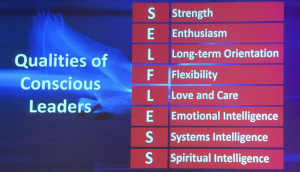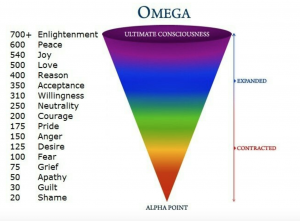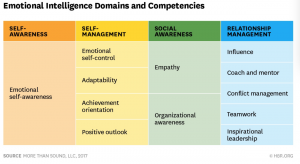I’m from Lubbock, Texas, the Hub of the Plains. Growing up in Lubbock in the 80s, I heard a lot about two heroes: Jesus and Jack Daniels.
In West Texas, both are extensively studied. Let’s just say growing up in Lubbock grounds you in a conservative, practical, and no bullshit way of living. Terms like “conscious leadership”, “meditation” or “higher purpose” weren’t really bandied about, at least in the practical business world.
I’m pretty sure that if a younger me had said “I’m embarking on a journey of exploration into Conscious Leadership,” I’d have gotten smacked.
We all understood and loved capitalism, and thought we knew all about it. As all good young budding capitalists do, I’d read Adam Smith’s The Wealth of Nations, which mentions trust, care, and doing the right thing, and that America, this little 242-year experiment of economic, political and religious freedom, was all you needed to understand capitalism. All you’d need to understand as you go about conducting yourself in the world.
So, you can imagine that I was a bit skeptical when in 2011 – just a few years after I founded Far West Capital – I was invited by good friends to go to the Conscious Capitalism CEO conference.
I got lucky. It was so different than I could have ever imagined – not the hippie convention I was expecting, I suppose. Instead, it opened this Lubbock boy’s eyes. Suddenly, I was looking at my leadership role in an entirely different light. Things started making sense. I could connect everything I wanted Far West Capital to be, every goal we had for our clients, into an updated 21st-century model of capitalism.
I had to understand more about this. I bought books; I watched TED talks. I’ve been to every Conscious Capitalism conference since that first one, and met many great leaders – including John Mackey and Raj Sasodia, who wrote the seminal tome on this topic – Conscious Capitalism. (You should also check out Raj’s TED Talk on the topic – it is an enthralling, fact-based endorsement of free-market capitalism and its positive effects on the world.)
For them, “conscious” thinking is capitalism’s next step – its higher calling, if you will. For me, it was a roadmap to a better, more conscious organization and self.
In the book,they describe the 4 Tenets of Conscious Capitalism:
- Conscious Leadership
- Stakeholder Orientation
- Conscious Culture
- Higher Purpose
As I started to apply what I was learning to my work at Far West Capital, I realized that the hardest one to achieve is the first – “conscious leadership.” Without it, none of the others have a shot, no matter how hard you try to implement them at your organization, because it is the leader who sets the table for these possibilities. It’s on me.
“Only three things happen naturally in an organization, friction, confusion, and underperformance. Everything else requires leadership”. ~ Peter Drucker
The following is a slide that Raj used in one of the presentations I attended…

I’m going to focus on just a couple of these that I consider sine qua non for being a conscious leader. (I encourage you to pick up Conscious Capitalism Field Guide: Tools for Transforming your Organization, which comes out March 20 and will cover these topics in much more detail and with examples.)
Flexibility
The requirements for change are desire and coachability. In other words, do you want to change? Do you even think change is necessary? Do you have the desire to do the work? Will you follow the instructions? Most people are fairly stuck in old patterns and it takes a lot to shake them from them, but can you choose to change? Can humans even evolve that dramatically?
The chart below is adapted from the classic book Power v. Force by Dr. David Hawkins M.D. Ph.D., where he calibrated human consciousness. He demonstrates and proves that in general, the world did not evolve past “courage” until 1995. It is a truly fascinating read and gives you of idea how the world has progressed, with several examples along the way and a map of how to evolve yourself.

Before we get too “woo woo” here, don’t forget: job #1 of the Conscious Leader is to evolve and get better as a human being. If you can’t be flexible enough to know you need to change (we all do) you can’t “be the change” – not without realizing that you must be flexible enough to change.
Emotional Intelligence – or “EQ”
I have met some super smart people – high IQ, photographic memories, you name it – over the years who, despite their smarts, failed to reach their goals. They were brilliant at books, but couldn’t understand the humans around them or even themselves at the same level they understood Einstein’s theories.
If we memorize, solve, exercise our brain to stay “smart”, why aren’t we also exercising our emotional smarts? Arguably, being able to understand yourself & others is a more valuable skill in life than, say, being able to reconstruct a Rubik’s cube.
It’s also key to conscious leadership. So once you have decided it is important to pursue a higher level of being and that you will do what is necessary, one way you do so is by developing your EQ.
Daniel Goleman, the undisputed godfather on the topic of EQ, breaks down the areas of fluency into four separate EQ “crucial competencies” – you can see them in the chart below.

If this is something you’re working on, these all make good guideposts for your self-evaluation. Need I say that this doesn’t happen overnight? You’re gonna screw it up – I sure do it regularly – but the whole point is to learn each time.
So to sum up, being a “conscious leader” is not about floating around talking about the esoteric, meditating, or even yoga (although those are all great, if you ask me!). It is about the really hard work of facing yourself, understanding where you are, and working diligently and persistently to grow and change from the inside.
Today, business leaders hold sway over culture, politics and the future in a way that has never been true before. So as you think about your particular role (and we are all leaders), look into how you can take 100% responsibility for yourself and embrace the uncomfortable change that is necessary for your Conscious Leadership journey.
Cole Harmonson is the CEO of Far West Capital, a company that funds the goals of high-growth entrepreneurs. Know a great company in need of capital to unleash their potential? Send them here and we’ll give them a call.


One quick comment since you refer to God. He promised that he will NEVER change. He has never changed a principal since the beginning of time. The same yesterday today and tomorrow.
At 82 years old I can affirm that business principals that are good ones have never changed either. Our younger people begin to succeed when they realize change is seldom good unless is it just change to use a new technology. The OLD principals are still true.
Great work Cole. I look forward to checking out some of the sources you mentioned. Publicly discussing your guiding principles and personal growth will encourage other business leaders to do the same, and contributes to a better business culture in Austin.